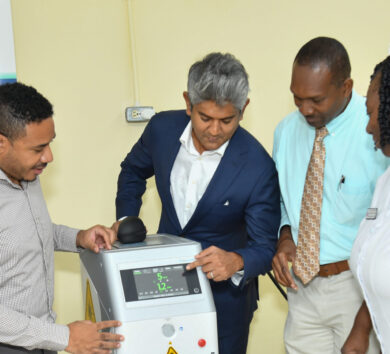

In examining the health profile of Jamaica’s population, the country is facing a crisis with non-communicable diseases (NCDs), according to Dr Christopher Tufton, minister of health and wellness.
Tufton was speaking during the launch of the Heart Foundation of Jamaica’s (HFJ) ‘Out of Our Schools’ mass media campaign held today (February 9) at the Spanish Court Hotel in St Andrew.
“A cohort of citizens will unfortunately have to spend the rest of their lives trying to make themselves as comfortable as they can but they will never be the same in terms of their health profile, their productivity, or with the time that they can spend with their family and friends,” he said.

Tufton was referring to alarming statistics on NCD rates in Jamaica as reported by entities such as the HFJ and the Ministry of Health and Wellness.
The ‘Out of Our Schools’ food policy campaign aims to continue the call for a strong national school nutrition policy and increase public knowledge about the health harms of excess consumption of foods high in sodium, sugar and fats. It is also intended to support policy makers in implementing a comprehensive school nutrition policy including the removal of unhealthy foods and beverages from schools with the support of parents and guardians.
Some of the statistics, as shared by the HFJ, state that 23 per cent of children in Jamaica aged 13-17 years are overweight and/or obese. More than 66 per cent of adolescents aged 15-19 years consume fast food most days of the week and more than 69 per cent of children aged 13-17 years drink carbonated soft drinks one or more times a day. Meanwhile, the country grapples with 80 per cent of deaths caused by NCDs.

In highlighting the crisis through the reality of people living with chronic kidney disease, Tufton said if individuals were to examine how people with the disease have to live in a typical week, they would see that they do treatment ideally three times on a machine for three hours at a time. Sometimes, they will do it twice because they cannot afford the ideal amount.
“By doing two, the quality of life is significantly further compromised. There is almost a predictability that without a kidney transplant, their expiration date can be defined. We can only conclude that when we get to that stage, your productive years have come to an end because you won’t be able to maximise your full potential. I could say the same for someone who has detected cardiovascular disease, blocked arteries and all the other critical categories of illness,” he said.
The minister highlighted that a large percentage of people living with NCDs before reaching their life expectancy might have avoided current health complications “if there was behavioural change, in how they operated in their environment, consumption, exercise, rest, and all the other critical things that make up a healthier lifestyle”.

“The most we can do now is build out hospital beds to give them a sense of comfort. It’s a tragic way to look at it but it is the harsh reality,” he said in reference to people with chronic NCDs.
“Our children still have hope of a better life, a fulsome life, a productive life and a life that has a better probability of existing up until 70-75 or beyond,” he said.
“When you look at it like that, we almost as adults have a duty, a burden, a responsibility to give them the best possible chance to fulfill that life-long experience.”
Send feedback to [email protected]







Comments